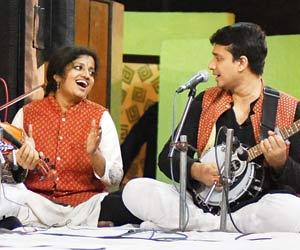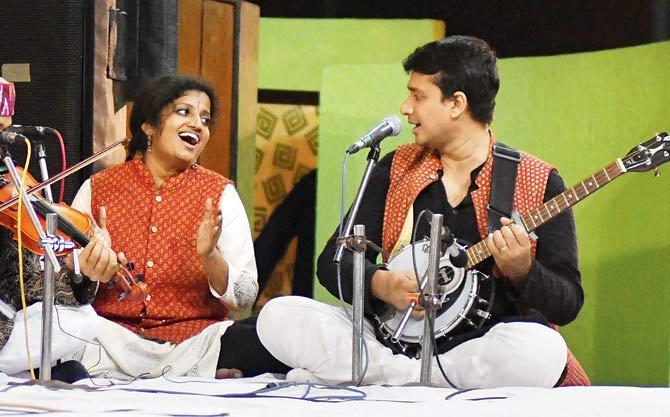There is something exalting about the Kabir Festival that takes place every January, and usually opens in the slums of Jogeshwari East, near the fish market

Bindhumalini Narayanaswamy and Vedanth Bharadwaj singing at the Kabir Festival. Pic/Ritu Joshi

Bindhumalini Narayanaswamy and Vedanth Bharadwaj singing at the Kabir Festival. Pic/Ritu Joshi
 There is something exalting about the Kabir Festival that takes place every January, and usually opens in the slums of Jogeshwari East, near the fish market. This year it was held in a small square, just off honking traffic and market crowds haggling over machchi and kebabs. Following the destruction of the Babri Masjid by right wingers, the Bombay riots took place in December 1992 and January 1993, in which around 900 people died throughout Mumbai, including in Jogeshwari.
There is something exalting about the Kabir Festival that takes place every January, and usually opens in the slums of Jogeshwari East, near the fish market. This year it was held in a small square, just off honking traffic and market crowds haggling over machchi and kebabs. Following the destruction of the Babri Masjid by right wingers, the Bombay riots took place in December 1992 and January 1993, in which around 900 people died throughout Mumbai, including in Jogeshwari.
ADVERTISEMENT
Years later, near "Ground Zero" in the suburb, the Kabir Festival suggests that music can also heal and be inclusive. Here, it often features Bindhumalini Narayanaswamy and Vedanth Bharadwaj, both trained in Carnatic and Hindustani classical music, singing qawwali songs such as the hypnotic Allah Hu and Aaj Rang Hai, along with Sufi songs by Padma Shri Prahlad Tipaniya's troupe, among others. The locals, mainly Muslims, are astonished that qawwalis, regarded as "Islamic music", appeals to a far wider audience including many faiths. The jaws of women in burqas drop (well, it is hard to see jaws dropping behind burqas, I admit) when they watch a woman lead a qawwali. And a South Indian woman — and in short hair, at that. Suddenly, even if briefly, all limitations seem to drop, and the possibilities of the heart seem endless. Soon, the crowd is clapping, caught up in the trance-like quality of the songs.
The Kabir Festival, Mumbai, held since 2011, includes classical music concerts, folk songs, dance performances, film screenings and talks in Mumbai, that celebrate the teachings of 15th century Sufi poet and sage Kabir, as well as other mystic poets from Sufi, Bhakti and other traditions throughout the Indian subcontinent. Kabir was a weaver-poet who believed that humanity and compassion were more important than religion. The festival reminds us of Kabir's relevance in India today, when prejudices, oppression and murders are increasingly common, and justice seems a distant dream, especially for minorities, including Muslims, Dalits and others. It is this inclusive India, with deep roots, that we celebrate. The festival is headed by Falguni Desai, who was first inspired when she heard Prahlad Tipaniya sing. "It unlocked something inside me and I felt compelled to share it with others," she said. It is also inspired by the Kabir Project, headed by filmmaker Shabnam Virmani who, following the Godhra riots, travelled with folk singers who have sung Kabir's music for generations.
The festival draws performers from all over India, including Prahlad Tipaniya, who sings Kabir in the Malwi tradition, Mooralala Marwada (Kutchi), Radhika Sood Nayak (Punjabi Sufi), Shruthi Vishwanath (Marathi abhangs) and Parvathy Baul and Lakshman Das Baul (Bengali baul music). Vedanth Bharadwaj's repertoire includes the terrific Bhajo re bhaiya, in which he accompanies himself with a cool, blues guitar. The festival is run by the Kabir community and partners: all the 15-odd performances from Fountain to Bandra, Borivli, Thane and Vashi are free and open to all (I'm a Kabir Festival volunteer). Tipaniya also walks the talk: a school teacher and farmer, he also runs a school for underprivileged children in Luniyakhedi, Madhya Pradesh.
The high point is the "unplugged" session, when all the musicians of different faiths and musical traditions jam together, often on Carter Road, at dawn by the sea: a soaring emotion sweeps us all in its embrace. There's a lovely Malwi phrase that sums up the feeling: mhara batya ghanela hoy —my joy increases through sharing.
Meenakshi Shedde is South Asia Consultant to the Berlin Film Festival, award-winning critic, curator to festivals worldwide and journalist. She can be reached onmeenakshishedde@gmail.com
Catch up on all the latest Mumbai, National and International news here
Download the new mid-day Android and iOS apps to get updates on all the latest and trending stories on the go
 Subscribe today by clicking the link and stay updated with the latest news!" Click here!
Subscribe today by clicking the link and stay updated with the latest news!" Click here!







